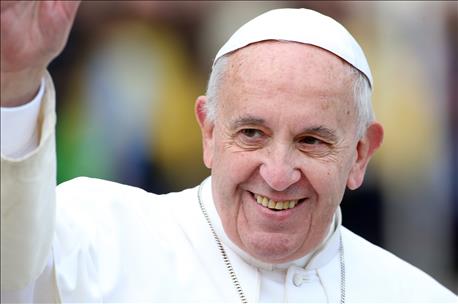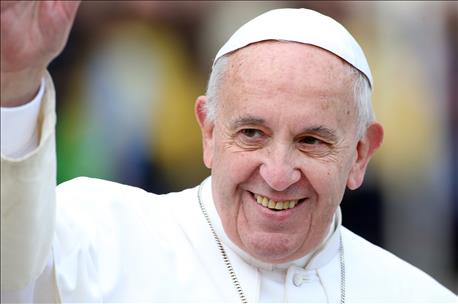November 14, 2016

In 2010, I wrote about a Lutheran church in North Dakota that was divided over GMOs. Members of the congregation were debating the Evangelical Lutheran Church of America’s proposed social statement on GMOs. It sounded as if the church assembly was saying that planting GMOs was a sin. At least that’s what it seemed like to me.
Now, the Catholics are getting into it, too. The Sustainable Pulse, an e-newsletter published by an anti-GMO organization, recently trumpeted the news that “Pope Francis has made his strongest attack yet on genetically modified plants and animals and the biotech industry.”

NO GMO: Pope Francis recently criticized what he called the improper modification of plants and animals. (Photo by Franco Origlia/Getty Images)
In a letter on Oct. 14 to the United Nations director general of the Food and Agriculture Organization, Pope Francis wrote:
“From the wisdom of rural communities, we can learn a style of life that can help defend us from the logic of consumerism and production at any cost, a logic that, cloaked in good justifications, such as the increasing population, is in reality aimed solely at the increase of profit. In the sector in which the FAO works, there is a growing number of people who believe they are omnipotent, or able to ignore the cycles of the seasons and to improperly modify the various animal and plant species, leading to the loss of variety that, if it exists in nature, has and must have its role. Producing qualities that may give excellent results in the laboratory may be advantageous for some, but have ruinous effects for others. And the principle of caution is not enough, as very often it is limited to not allowing something to be done, whereas there is a need to act in a balanced and honest way. Genetic selection of a quality of plant may produce impressive results in terms of yield, but have we considered the terrain that loses its productive capacity, farmers who no longer have pasture for their livestock, and water resources that become unusable? And above all, do we ask if and to what extent we contribute to altering the climate?
“Not precaution, then, but wisdom: What peasants, fisherman and farmers conserve in memory handed down through the generations and which is now derided and forgotten by a model of production that is entirely to the advantage of a limited group and a tiny portion of the world population. Let us remember that it is a model which, despite all its science, allows around 800 million people to continue to go hungry.”
You can read the full text of Pope Francis’ letter at bit.ly/2etIVd1.
I think Pope Francis is wrong about GMOs. I don’t think they are ruining the planet. They are improving it. They are improving it by making it possible to reduce tillage — which improves soil health — and to eliminate insecticide applications.
GMOs aren’t responsible for depleting water resources or destroying grasslands. Farmers would grow corn, with or without GMOs. If the market was calling for more corn, they would still convert grassland to cropland.
Because there is still hunger in the world doesn’t mean GMOs are immoral. It means we still have more to do. Being able to improve crops faster with genetic engineering is the best hope all the world’s farmers have to grow more food. We must press ahead with GMOs.
You May Also Like




